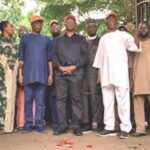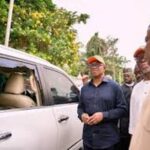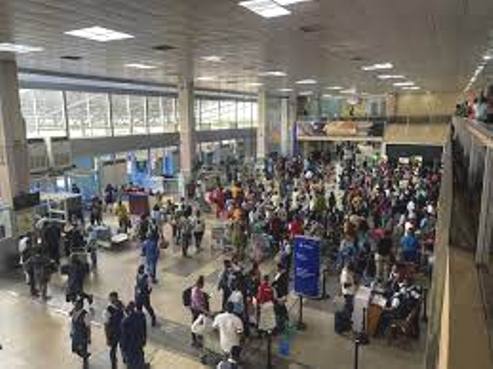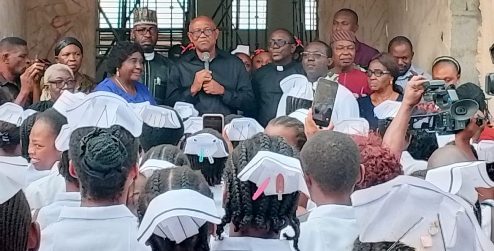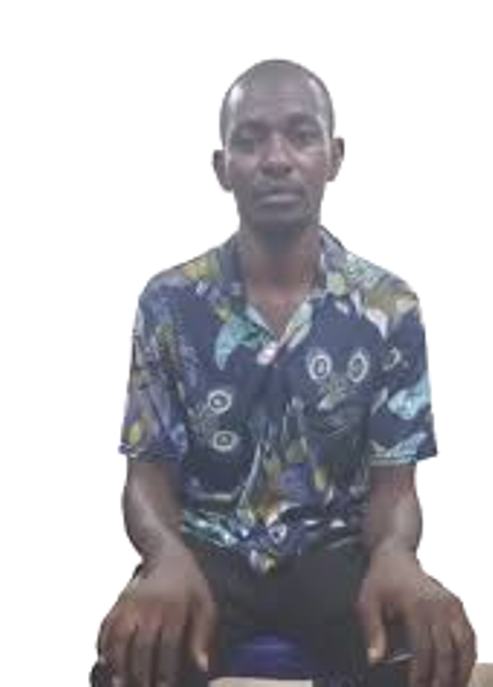LAGOS DECEMBER 17TH (NEWSRANGERS)-As the yuletide approaches, air passengers are facing increasing discomfort over the high cost of tickets. Daily Trust on Sunday reports that a one-way flight ticket costs up to N200,000, depending on the route.
Checks by our correspondent showed that ahead of Christmas and New Year, many seats have been booked; and as the festive period draws nearer, available seats are becoming more expensive.
The eastern routes are the most affected, with Enugu flight tickets selling between N171,000 and N200,000.
Checks by our correspondent indicate that the base fare to Port Harcourt is N99,000 and projected to hit N138,000 as bookings increase.
Lagos to Owerri, from December 5 sells between N114,400 and N190,600 for a one-way economy ticket and N238,200 for business, while the base fare for Lagos-Calabar is N100,000.
At the moment, a 30-minute flight to Ilorin from Lagos costs between 100,000 and N143,000 for economy class.
Lagos to Sokoto ticket goes for N150,000, while a Lagos-Kaduna ticket is N143,000 as the base fare.
How airfares have doubled in one year
Our correspondent reports that an economy ticket one-way flight has increased from N50,000 (by 100 per cent) to over N100,000 on some routes. Airlines are blaming the hike on the prevailing economic challenges, especially high cost of operation.
The airlines had in 2022 increased a one-way ticket to N50,000 from N30,000. This had generated controversy in the travel industry.
But at present, a one-way economy ticket base fare is around N80,000.
Some of the factors cited by airline operators who spoke to Daily Trust on Sunday include high cost of aviation fuel, known as Jet A1, high exchange rate, multiple charges, among others.
The managing director/chief executive of Aero Contractors, Capt Ado Sanusi, recently told our correspondent that with the current rate of exchange, a one-way ticket should sell for over N130,000.
According to him, any operator pricing his ticket low might be cutting corners.
He said, “You can quote me on this: When the dollar was N460 we were selling a Lagos-Abuja ticket at N65,000, but the dollar is now twice that amount. And there is nothing we do in aviation that is not dollarised. You can imagine. So, we should be selling the ticket at N130,000.
“We don’t manufacture the aircraft; we don’t even refine the oil. So, what else do you do? We don’t even do the wheel on an aircraft. We also have to buy the bolts on the aircraft outside the country. So the moment the dollar is rising, we are affected. The fuel we buy is imported, as well as parts of the aircraft, so how would anybody tell me that he would not increase his ticket, except he is cutting corners. The only thing we can control is manpower.”
Another airline operator who spoke on condition of anonymity noted that the aviation industry was not immune to the inflationary pressure in the country.
He said with the rise in the dollar, airlines could not afford to maintain the old prices of tickets.
Experts urge govt to control fares
Experts warned that the situation might get worse if the operational challenges confronting the airlines persist. They noted that with the deregulation of the industry, airlines had been empowered to fix their prices in line with the demand and supply principle.
They called on the Nigerian Civil Aviation Authority (NCAA) to intervene by controlling fares, saying the more they go up, the more prospective passengers would try alternatives if they are unable to afford airfares.
Capt Samuel Caulcrick, the chief executive officer of Merchant Express Cargo Limited said, “There will be no respite because we have dollarised the economy. Besides, every component in commercial air transport, apart from personnel wages, rent, etc, is in forex.
“It is only an aggressive import substitution policy that will calm the forex market, but the government has to take the lead.”
The general secretary of Aviation Roundtable, Mr Olumide Ohunayo, in a chat with our correspondent, said the situation might get worse as the yuletide approached.
Ohunayo advised airlines to have a human face in determining their fares.
He said, “The rule of airfare, apart from the cost components, is that of demand and supply. And if you look at it, some routes are getting very busy and they just have one airline on the route. When you have one airline on a particular route, the price goes crazy, which was what happened when we had one airline on the Enugu route.
“At a time, Enugu flight was going for N150,000 when other routes were going for about N70,000 or N80,000.
“What we can only push for is to have more airlines or more aircraft for the airlines to increase their capacity. The more seats you have, the more competition and advantage for passengers.”
Group Capt John Ojikutu also defended airlines, saying, “Majorly, the tariffs are: fuel prices, ground handling service charges, air traffic control/navigational charges, landing and parking charges, catering etc.
“Increase in fuel prices has been incessant in the last six months because of the price of the dollar (from #500/$ to #1000/$), 100 per cent increase, and because it is being imported. Periodic maintenance like the c-checks on aircraft would need the dollars, and that could put extra charges on airfares.”
Be reasonable in prices for more people to fly, Expert advises
An aviation expert, Dr Daniel Young, said there must be a way to handle the issue of pricing so that passengers would not stop flying.
“The people who are driving this change in price also must consider that those flying their airplanes are majorly government workers. This is because as a businessman, I don’t see an Igbo man paying N300,000 to go from Onitsha by air to purchase goods.
“Now, airline business is operating at only two per cent of total passenger traffic in Nigeria; and the higher you go up in price, the more you lose out in terms of passenger number. So, if you are losing, then the entire business model, which is supposed to be low-cost, is already lost because it is all about making it affordable so that you can increase your revenue or profit through compound interest. And as more people fly, you take marginal profit that you translate into huge profit,” Young said.
He said that rather than increase fares, airlines should churn out promos ahead of the yuletide.
“Have you ever seen any airline advertising anything? They would rather keep increasing because of insecurity in the land.
“How do we reach a compromise? And that is why I said that in terms of economic regulations, the NCAA has a full right to regulate the industry. It may not impose any price on them, but it should ask questions; such as: Is there no way they can manage this so that everybody in the industry would not feel the bite, including passengers?
“Should the passengers stop flying, the airports become warehouses and the airplanes would be left unused. And mind you, most of these airplanes are on wet-lease and they have paid for block hours. Whether you fly or not, the person who gave you the aircraft must collect his money,” he said.
Airlines are in business to make money – NCAA DG
The director-general of the Nigerian Civil Aviation Authority, Capt Musa Nuhu, in an interview with Daily Trust on Sunday, admitted that the economic situation in the country made things extremely difficult for airlines.
“I understand passengers’ complaint of airfares increasing. Yes, I sympathise with them, but airlines are in the business to make money. Unfortunately, the economic situation in the country has made it very difficult for the airlines. I am not being insensitive, but I sympathise with the passengers.
“How many times has the price of fuel gone up? It has tripled/quadrupled in the last one year? Foreign exchange has gone to over N1,000/$. If you want to service your aircraft at $1million, it is equivalent to N1billion. You can imagine that.”
According to him, if the cost of production can’t be controlled, there is no need to control price.
Airlines advised to merge
Despite the numerous problems affecting airlines in Nigeria, some experts said the operators could still make profit through collaboration.
Tijjani Shehu, who worked with some airlines, both in Nigeria and the United States, said investors should look at the business from a different perspective instead of floating aircraft as status symbol.
He said, “The issue here is that every person wants to have his or her airline for commercial purposes; and that is why they are not getting it right.
“How do you expect someone with two or three aircraft to make any headway? It is not possible.
“They should come down from their high horses and merge for comparative advantage. If two or three of the airlines could come together, they stand to gain more because the taxes they would be paying would be less, and they would not have a top heavy organogram. They would be more efficient and could cover more routes with ease,” he said.
Another aviation expert said, “The major problem is that the airlines are small operations, not large enough to absorb changes in the market while keeping prices reasonable.
“If the airlines were large, for example, if they were forced to merge and consolidate, there would be more efficiency in their operations and routes; and therefore, less need to keep increasing prices at the slightest opportunity.”
DailyTrust
For advert placement, events coverage, media placement, public relation consultant and further inquiries please WhatsApp 2348023773039 or email: labakevwe@yahoo.com




